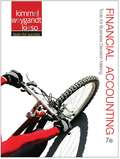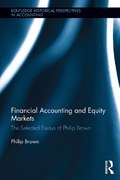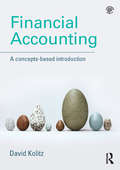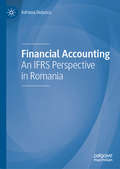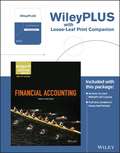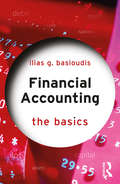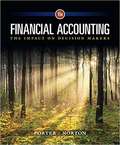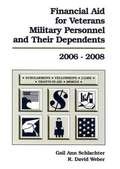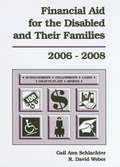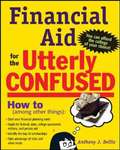- Table View
- List View
Financial Accounting Tools for Business Decision Making 7e
by Donald E. Kieso Jerry J. Weygandt Paul D. KimmelWritten in a concise, clear, and conversation way, Kimmel Financial Accounting provides just the right amount of information students need to come to class prepared. Starting with the big picture of financial statements first, Paul Kimmel shows students why financial accounting is important to their everyday lives, business majors, and future careers. This best-selling financial accounting text is known for the most relevant and easy to understand examples, while teaching students the accounting cycle through the lens of one consistent story of Sierra Corp, an outdoor adventure company.
Financial Accounting and Equity Markets: Selected Essays of Philip Brown (Routledge Historical Perspectives in Accounting #4)
by Philip BrownPhilip Brown is one of the most admired and respected accounting academics alive today. He was a pioneer in capital markets research in accounting, and his 1968 article, co-authored with Ray Ball, "An Empirical Evaluation of Accounting Income Numbers," arguably had a greater impact on the course of accounting research, directly and indirectly, than any other article during the second half of the twentieth century. Since that time, his innovative research has focused on issues that bridge accounting and finance, including the relationships between net profit reports and the stock market, the long-run performance of acquiring firms, statutory sanctions and voluntary corporate disclosure, and the politics and future of national accounting standards to name a few. This volume brings together the greatest hits of Brown’s career, including several articles that were published in out-of-the-way places, for easier use by students and researchers in the field. With a foreword written by Stephen A. Zeff, and an introduction that discusses the evolution of Brown’s research interests and explains the context for each of the essays included in the volume, this book offers the reader a unique look inside this remarkable 50-year career.
Financial Accounting and Management Control
by Fredrik Nilsson Anna-Karin StockenstrandThis book is about financial accounting and management control and how these two information systems are related as well as how their objectives conflict. At the most fundamental level, the objective of financial accounting is to provide owners and funders with comparable information on a company's value creation. The aim of management control, on the other hand, is to give the board, senior executives and employees unique information for strategy formulation and implementation. One often-mentioned negative effect is the risk of financial accounting affecting management control design and use, making it less relevant for decision-making at the company level. The book provides an analysis of the complex relationship between financial accounting and management control. The analysis is based on theoretical reasoning as well as several examples of how financial accounting standards affect not only the annual report but also the control system. An interesting, and perhaps unexpected conclusion is that management control seems to affect financial accounting almost as much as financial accounting affects management control. These complex relationships, which can influence the design and use of both financial accounting and management control, are discussed in detail in this book.
Financial Accounting and Reporting for Non-Accounting Students: How to Interpret Financial Statements and Appraise Company Performance
by Stephen FrostThis textbook introduces the essential principles of financial accounting to non-accounting students, written for an international audience with global case studies and a suite of learning features.Using terminology which is compliant with International Financial Reporting Standards (IFRS), Financial Accounting and Reporting for Non-Accounting Students covers topics such as the statement of financial position, profit and loss statements, non-current assets, inventory valuation and the statement of cashflows. It also provides a roadmap for performance appraisal and presents the subjective nature of financial accounting and the impact of bias in financial reporting.Real-world case studies from Huawei, Ryanair and Greggs illustrate the principles discussed in the book and a fictional performance appraisal case study demonstrates how financial metrics can be applied to analyse the effects of new entrants on an incumbent's operating performance. With over 300 multiple-choice questions, 44 extended problems and more than 90 questions to enable deep learning in the fundamental aspects of this core business subject, Financial Accounting and Reporting for Non-Accountings Students is a key textbook for undergraduate and postgraduate students taking modules on financial accounting and reporting or introductory modules in accounting.
Financial Accounting for Decision Makers
by Mark DeFondWith a comprehensive and accessible introduction to the subject, Financial Accounting for Decision Makers focuses on the ways in which financial statements and information can be used to improve the quality of decision making. The practical emphasis throughout the book ensures the material is always relevant, whilst the authors’ style of introducing topics gradually and explaining technical terminology in a clear, friendly style caters for all students, whether on specialist accounting or non-specialist business degrees.
Financial Accounting for Undergraduates (3rd Edition)
by James Wallace Karen Nelson Ted Christensen Ken FerrisWelcome to the Third Edition of Financial Accounting for Undergraduates. We wrote this book to satisfy the needs of students taking their first financial accounting course by providing a high quality, contemporary, and engaging textbook at an affordable price. Financial Accounting for Undergraduates is written for students who want to understand how financial statements are prepared and how the information in published financial reports is used. The Third Edition has benefited from extensive feedback from adopters of the first two editions and suggestions from focus groups, market surveys, manuscript reviews, and interviews with faculty from across the country.
Financial Accounting with International Financial Reporting Standards
by Jerry J. Weygandt Paul D. KimmelAn essential and intuitive treatment of financial accounting with an international perspective <p><p>The use of International Financial Reporting Standards is growing rapidly, both outside of the United States and within, especially as IFRS incorporates more US GAAP rules. In the newly updated fifth edition of Financial Accounting with International Financial Reporting Standards, a team of accomplished financial practitioners and educators delivers the newest version of their highly anticipated text. This important work offers practical end-of-chapter exercises and practice problems complete with foreign currency examples, as well as an emphasis on non-US companies and examples. It is perfect for accounting students seeking exposure to internationally utilized accounting standards.
Financial Accounting: A Concepts-Based Introduction
by David KolitzFinancial accounting is the branch of accounting thought and practice concerned with preparing and providing information for external users of financial statements. This textbook helps students to understand the concepts that underpin the application of accounting theory to solve accounting problems. This international edition includes extracts from financial statements, definitions of key terms and exam examples. Unlike other textbooks, the author provides analysis of why accountants do what they do, and not just how. With such a wealth of accounting models and diagrams intertwined with this analysis, this book guides the reader through all the practicalities and concepts of financial accounting. Additional online questions, exercises and problems provide an opportunity to put this new-found knowledge into practice along the way. This book is an essential guide for students new to accountancy, and an equally useful tool for more experienced students and researchers.
Financial Accounting: An IFRS Perspective in Romania
by Adriana DuțescuThis book covers the principles, concepts, techniques and practical tools of financial accounting in supporting overall business decisions. Using a comprehensive theoretical framework, this book is enhanced by practical examples, exercises, chapter summaries and complex cases in each of the eleven chapters. With the International Financial Reporting Standards (IFRS) and their specific Conceptual Framework as the baseline approach, this book also highlights Romanian regulation and practice specifically. Despite the globalisation efforts, this book demonstrates that there are still discrepancies and cultural challenges and will be of interest to students and academics of financial accounting.
Financial Accounting: An Introduction (Routledge Library Editions: Accounting)
by John BlakeThis book is a practical textbook for first-year students. It begins by describing the nature and environment of accounting and continues with an examination of the double entry book-keeping system. There are chapters on the principles which govern accounting practice and the presentation and interpretation of accounts. Inflation accounting is also covered as are cash budgets and funds flow.
Financial Accounting: An Introduction To Concepts, Methods And Uses
by Roman L. Weil Katherine Schipper Jennifer FrancisIdeal for graduate, MBA, and rigorous undergraduate programs, FINANCIAL ACCOUNTING: AN INTRODUCTION TO CONCEPTS, METHODS, AND USES 14e presents both the basic concepts underlying financial statements and the terminology and methods that allows the reader to interpret, analyze, and evaluate corporate financial statements. Fully integrating the latest International Financial Reporting Standards, inclusive of the latest developments on Fair Value Accounting, and now more streamlined for busy students, this text provides the highest return on your financial accounting course investment. With great clarity, this widely respected financial accounting text paces students appropriately as they learn both the skills and applications of basic accounting in earlier chapters as well as the impart the concepts and analysis skills they will use as future business leaders.
Financial Accounting: Binder Ready Version (Tenth Edition)
by Donald E. Kieso Jerry J. Weygandt Paul D. KimmelMore students get accounting when using Weygandt, Kimmel, Kieso, Financial Accounting, 10th Edition Loose-leaf Print Companion because of the unique Framework of Success created and refined by the authors based on years of teaching and course design experience. In WileyPLUS and in print, clear and relevant exposition, engaging visuals and videos, and valuable end-of-chapter material work together to build students' confidence and mastery of accounting concepts and skills. The new 10th edition of Financial Accounting Loose-leaf Print Companion by Weygandt, Kimmel, and Kieso continues to provide students with a clear and comprehensive introduction to financial accounting and has been thoroughly updated with extensive digital resources to further enhance student learning and success.
Financial Accounting: The Basics (The Basics)
by Ilias BasioudisUnderstanding the basics of financial accounting can be a tricky task to master. This practical guidebook provides an overview of the fundamental principles in a jargon-free and simple format. Financial Accounting: The Basics provides concise overviews of the key financial accounting topics supplemented by practical examples and exercises to enable readers to test their knowledge and understanding in bite-sized chunks. In empowering students to learn at their own pace, the book enhances course learning to maximise chances of overall success. Topics covered include: The interpretation of financial statements and the accounting equation Processing accounting information Accounting for inventories Non-current assets and depreciation Cash flow statements and analysis With the latest coverage of International Financial Reporting Standards (IFRS) terminology, and separate chapters on cash flow statements and ratio analysis, Ilias Basioudis's text will be valuable reading for new students of accounting.
Financial Accounting: The Impact on Decision Makers
by Gary Porter Curtis NortonFINANCIAL ACCOUNTING: THE IMPACT ON DECISION MAKERS 10E, now available as a bundle option with CengageNOWv2, will help you learn how to use accounting information to make business decisions and focus on the big picture. Journal entries in the text and CengageNOWv2 demonstrate the balance sheet and income statement impact of transactions, helping you see how business events ultimately impact the financial statements. In addition to exposing you to annual reports of highly recognizable companies such as Nike, Porter's exclusive Ratio Decision-Model provides a framework for reading and interpreting financial statements to make decisions. The focus on financial statements and decision-making carries through to the end-of-chapter with a suite of case materials so you can practice reading and interpreting financial statements. In addition, this edition uses a new modular organization, allowing you to absorb the content in smaller sections for better retention.
Financial Accounting: Tools For Business Decision Making
by Paul Kimmel Jerry Weygandt Donald KiesoStarting with the big picture of financial statements first, Paul Kimmel's Financial, 8th Edition, shows students why financial accounting is important to their everyday lives, business majors, and future careers. This best-selling financial accounting program is known for a student-friendly writing style, visual pedagogy, the most relevant and easy to understand examples, and teaching the accounting cycle through the lens of one consistent story of Sierra Corp, an outdoor adventure company.
Financial Accounting: Tools for Business Decision Making
by Jerry J. Weygandt Paul D. Kimmel Jill E. MitchellFinancial Accounting: Tools for Business Decision Making by Paul Kimmel, Jerry Weygandt, and Jill Mitchell provides a practical introduction to financial accounting with a focus on how to use accounting information to make business decisions. Through significant course updates, the 10th Edition presents an active, hands-on approach to spark efficient and effective learning and develops the necessary skills to inspire and prepare students to be the accounting and business professionals of tomorrow. <p><p>To ensure maximum understanding, students work through integrated assessment at different levels of difficulty right at the point of learning. The course's varied assessment also presents homework and assessment within real-world contexts to help students understand the why and the how of accounting information and business application. <p><p>Throughout the course, students also work through various hands-on activities including Cookie Creations Cases, Expand Your Critical Thinking Questions, Excel Templates, and Analytics in Action problems, all within the accounting context. These applications all map to chapter material, making it easier for instructors to determine where and how to incorporate key skill development in their syllabus. <p><p>With Financial Accounting, students will understand the foundations of financial accounting and develop the necessary tools for business decision-making, no matter what path they take.
Financial Adulting: Everything You Need to be a Financially Confident and Conscious Adult
by Ashley Feinstein GerstleyPerfect for anyone seeking to get a firm handle on their personal finances, Financial Adulting is a must-have resource that demystifies and simplifies complex topics and makes understanding personal finance fun From the founder of The Fiscal Femme, a popular feminist money platform, and author of The 30-Day Money Cleanse, Ashley Feinstein Gerstley's Financial Adulting: Everything You Need to be a Financially Confident and Conscious Adult delivers an easy-to-follow, informative, and fun financial guide. From budgeting and consumer activism to retirement investing and paying down debt, you'll learn everything you need to know and do to be a financially savvy adult. In this important book, you'll: Master fundamental concepts, including dealing with student loans, maximizing your 401(k), and preparing for salary negotiations Use a racial and feminist justice lens to tackle rarely discussed topics in money and equity and better understand deep-seated historic and systemic obstacles Recognize that your circumstances, goals, and values are unique and require a custom approach in order to succeed financially Receive a simple step-by-step guide to reaching your financial goals while living a big, exciting, and meaningful life
Financial Advice and Investment Decisions
by Frank J. Fabozzi Jarrod W. WilcoxA practical guide to adapting financial advice and investing to a post crisis world There's no room for "business as usual" in today's investment management environment. Following the recent financial crisis, both retail and institutional investors are searching for new ways to oversee investment portfolios. How do you combine growth with a focus on wealth preservation? This book offers you a fresh perspective on the changes in tools and strategies needed to effectively achieve this goal. Financial Advice and Investment Decisions provides today's investment professionals with the conceptual framework and practical tools they need to successfully invest in and manage an investment portfolio with wealth preservation as a key concern. While there are many qualitative discussions, the authors present strong quantitative theory and practice in the form of small conceptual models, simulation, and empirical research. A comprehensive guide to properly managing investments with a focus on matching security and growth goals with the needs of the investor Blends insights gleaned from portfolio management practices used prior to the market mayhem of 2007-2009 with cutting-edge academic and professional investment research Includes innovative and wide-ranging treatment of subjects such as augmented balance sheets, the efficiency of markets, saving, spending, and investing habits, and dealing with uncertainty Description of opportunities for improving the investing environment The recent financial crisis has opened our eyes to the need for improving the way we invest. This book will put you in a better position to excel in this new economic environment.
Financial Advisor (Careers With Character #18)
by Sherry BonniceFind out what it takes to be a financial advisor with character... Financial advisors show people better ways to manage their money. They help their clients: *Invest in stocks and bonds; *Save for the future; *Plan for home ownership; *Set aside funds for their children's college education; and *Look ahead toward retirement. Find out what you'll need if you pursue a career in this field: The education... The experience... The integrity... And the respect for others. Financial Advisor will tell you what you'll need.
Financial Aid for Hispanic Americans 2006-2008
by R. David Weber Gail Ann SchlachterA List of Scholarships, Fellowships, Loans, Grants, Awards, and Internships Open Primarily or Exclusively to Hispanic Americans and a Set of Six Indexes (Program Title, Sponsoring Organizations, Residency, Tenability, Subject, and Deadline Date)
Financial Aid for Veterans, Military Personnel and Their Dependents 2006-2008
by R. David Weber Gail Ann SchlachterVeterans, military personnel, and their dependents make up more than one third of America's population. Each year, public and private agencies set aside billions of dollars in financial aid for these groups (including the spouses, children, grandchildren, and dependent parents, and siblings of veterans and military personnel). If you have ties to the military, Financial Aid for Veterans, Military Personnel, and Their Dependents is the right book for you.
Financial Aid for the Disabled and Their Families 2006-2008
by R. David Weber Gail Ann SchlachterBillions of dollars in financial aid have been set aside for America's largest minority: the more than 50 million Americans with disabilities and members of their families. In fact, more money is available today than ever before! This funding is open to applicants at any level (high school through postdoctorate and professional) for study, research, travel, training, career development, assistive technology, specially-adapted housing, tax relief, and many other purposes.
Financial Aid for the Utterly Confused
by Anthony J. BelliaYes, you can afford a top-notch college education! You'll want to leave no stone unturned when it comes to paying for a great college education, so get the guide that answers all your questions! Written by a top financial aid pro with 30 years' experience, Financial Aid for the Utterly Confused clues you in on all your financing aid options. And it walks you through the entire process of obtaining the maximum amount to which you may be entitled. You get: Expert guidance on applying for all forms of financial aid; Insider tips on government and private financing, grants, and more; Proven cost-cutting strategies; Sample forms and worksheets; Early financial planning strategies for parents.
Financial Algebra
by Robert Gerver Richard SgroiBy combining algebraic and graphical approaches with practical business and personal finance applications, South-Western's FINANCIAL ALGEBRA, motivates high school students to explore algebraic thinking patterns and functions in a financial context. FINANCIAL ALGEBRA will help your students achieve success by offering an applications based learning approach incorporating Algebra I, Algebra II, and Geometry topics. Authors Gerver and Sgroi have spent more than 25 years working with students of all ability levels and they have found the most success when connecting math to the real world. FINANCIAL ALGEBRA encourages students to be actively involved in applying mathematical ideas to their everyday lives.
Financial Algebra: 2019 Tax Update Edition
by Robert Gerver Richard SgroiBy combining algebraic and graphical approaches with practical business and personal finance applications, FINANCIAL ALGEBRA, Second Edition, motivates high school students to explore algebraic thinking patterns and functions in a financial context. FINANCIAL ALGEBRA, Second Edition will help your students achieve success by offering an applications based learning approach incorporating Algebra I, Algebra II, and Geometry topics. Authors Gerver and Sgroi have spent more than 25 years working with students of all ability levels and they have found the most success when connecting math to the real world. With new features, such as What’s the Problem?, FINANCIAL ALGEBRA, Second Edition encourages students to be actively involved in applying mathematical ideas to their everyday lives.
